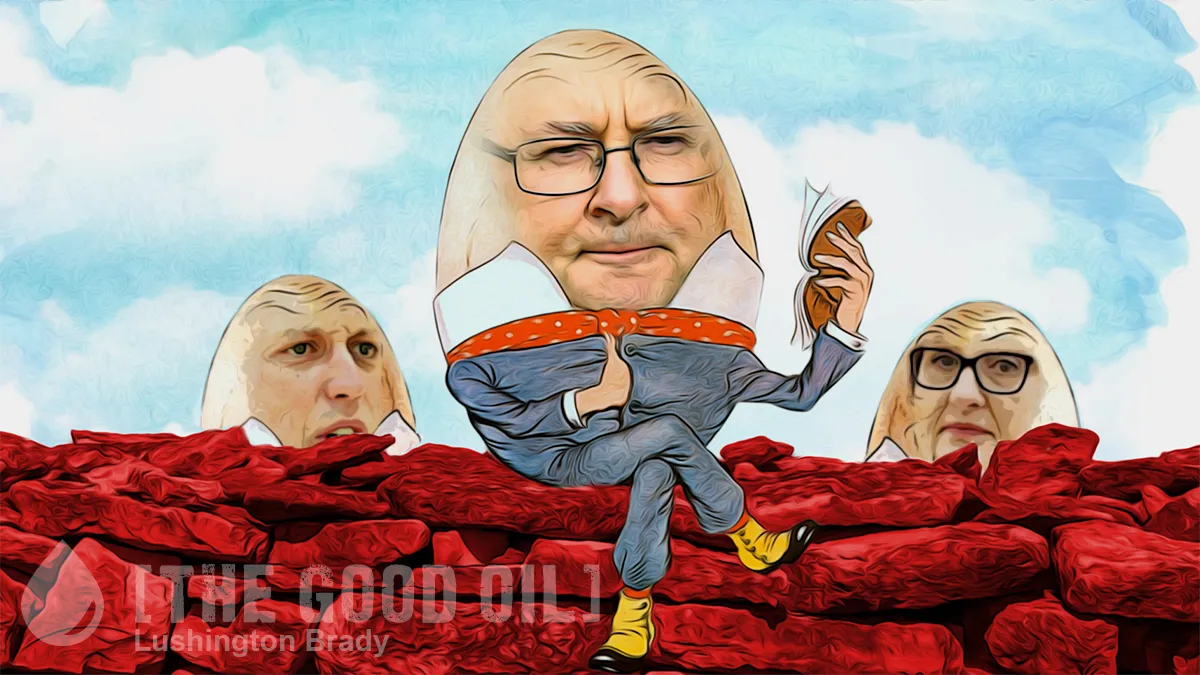Bryce Edwards
Dr Bryce Edwards is the Political Analyst in Residence at Victoria University of Wellington. He is the director of the Democracy Project.
Victoria University of Wellington
The mini-sausage budget was launched by Finance Minister Nicola Willis yesterday with her argument that “What New Zealanders care about is the size of the sausage, not how it’s delivered”. But commentators haven’t been so wowed by the Government’s latest plans. 1News analyst Garth Bray summed it up as “more sizzle than sausage” and that Willis’ announcement reeked of “making announcements about announcements to come”, something that National had often criticized the last government for – see: The Chipolata Budget – more sizzle, less sausage.
Although Nicola Willis may not have wanted her announcement to be remembered as the “mini-sausage budget”, she didn’t have any better names, apart from her insistence it was “the mini-mini-mini budget”. Labour’s Grant Robertson’s alternatives were: “micro budget”, “nano budget”, or “the nothingburger budget”.
For the most interesting review of Willis’ announcement, see Joel MacManus’ Ginger kisses and fiscal cliffs: The view from parliament on mini mini mini budget day. And here’s the key part of his report, that sums up the mini-budget:
“There wasn’t anything too surprising in the budget itself. Willis had found $7.4 billion in savings by following through on various campaign promises, and the home-owning class got their tax cuts thanks to the bright-line test being moved back to two years. There was still no indication of how National would pay for their promised tax cuts of up to $250 per fortnight for the “average household” (which turned out only to be 3000 households nationwide). Willis said the savings were a “down payment” towards the tax cuts. In other words, she’s still trying to find the money.”
MacManus also clearly asserts that the budget announcement was more about politics than finances, as it “ended up being mostly a bunch of positioning and finger-pointing. Willis tried to cast blame on the previous government for all the economic ills of this country, and Labour threw dirt about lack of detail.” And he explains that the Finance Minister’s “top priority, it seemed, was throwing as much shade on Grant Robertson as possible.” Hence, he points out that Willis’ spent much of her time describing the last government with the terms “fiscally reckless”, “fiscal vandalism”, and “economic mismanagement”. And the phrase of the day, MacManus says, was “fiscal cliffs”.
The Herald’s Thomas Coughlan was also rather derisive about the substance of Willis’ announcement:
“At just six pages (double-sided) of press releases, it came in at about 0.3 per cent of the size, in pages, of an actual Budget, and left some major questions unanswered, including around the shape of the new Government’s tax policy – a key campaign commitment”
– see: Nicola Willis’ mini-budget: Tax cuts still planned despite gloomy economic outlook (paywalled).
Of course, Willis wasn’t expected to give all the details of next year’s tax cuts, but Coughlan says she failed to deliver much at all:
“there had been a hope the mini-Budget would offer some signalling of the shape and cost of the cuts. Instead, it included a list of 16 decisions made by Cabinet that would have an impact on the Government’s books. Of those changes just one, returning the bright-line test to two years from 10, was a tax promise.”
And although Willis had found $7.4 billion in savings, Coughlan points out that it sounds bigger than it really is, as those cuts are spread over four years, and “equates to a little over 1 per cent of total government spending”.
Newsroom’s Marc Daalder was also underwhelmed by Willis’ announcement:
“Her mini Budget may also be a bit of a fizzer. There’s nothing in there about tax relief for New Zealanders, unless you’re a landlord (with the return of interest deductibility officially confirmed) or a property investor (the brightline test will be shortened back to two years)”
– see: No smoking gun for Willis but struggling economy will do.
Stuff political editor Luke Malpass says that Willis’ announcements yesterday succeeded, at least in a political sense:
“The mini-Budget itself was modest. A one-page list of well-telegraphed changes that will pare back Government spending a bit over four years and make some fiscal room for a tax cut package to be delivered in the May Budget. It was more importantly a political statement from Finance Minister Nicola Willis about the Government’s intent and its approach to getting the country back into surplus. That was the key role it had to play – setting expectations for the coming six months. It succeeded in that regard.”
But Malpass also draws attention to the economy being in worse shape than expected, and that “all of New Zealand’s headline economic growth over the coming two years or so is expected to be generated by much needed inward migration – which in itself is inflationary” – see: Nicola Willis, the Reserve Bank and a tough road ahead (paywalled).
In another analysis piece, Malpass says that although there’s not much new in yesterday’s mini-budget, and much of it is political rather than fiscal, it still serves a powerful purpose in getting across to voters that “the Government found $7.5 billion in just three weeks and by the time the May Budget rolls around they should be able to find quite a bit more” – see: Nicola Willis’ mini-Budget draws spending line in the sand (paywalled).
The difficult task facing the Finance Minister was made very clear in the announcement according to Herald business journalist Jenée Tibshraeny, who says the financial situation is clearly much worse than Nicola Willis was expecting, and there’s now a major problem for the parties of government who campaigned on returning the books to surplus, cutting taxes, and continuing major investment in infrastructure – with the clear conclusion: “Something is going to have to give” – see: Nicola Willis’ mini-Budget and Treasury’s Hyefu show something’s going to have to give to get books back in shape (paywalled).
There will be some major trade-offs needed to achieve the Government’s promises. And Tibshraeny reports that “Nicola Willis conceded the Government may need to cancel or delay some infrastructure projects on the back of major cost blow-outs, and given capacity constraints in the economy”.
A bigger squeeze might also be expected to come on the public service: “She stood by her pre-election promise to get government departments to cut spending by 6.5 per cent, going further by saying she’d ask agencies whose staff had grown by more than 50 per cent since 2017 to cut spending by 7.5 per cent.” And Willis was reported as “saying there is ‘urgent need’ for a cultural change in the public sector to cut spending.”
Yesterday’s Herald editorial is also critical of Willis’ budget rhetoric, and the Government’s continued promise of tax cuts:
“with accusations of “economic vandalism”, Nicola Willis risks straying into hyperbole that will only serve to undercut her credibility in the long run. The paradox in the negative rhetoric is that, if things are really as bad as Willis suggests, then we surely cannot afford tax cuts. Yet National remains committed to this policy, effectively creating a self-inflicted fiscal restraint”
The other big Government news yesterday was Prime Minister Christopher Luxon’s meeting with his Australian counterpart Anthony Albanese in Sydney, with the very clear messaging that New Zealand wants to be more closely aligned on defence and security.
RNZ’s Giles Dexter reported that “New Zealand is ‘exploring’ joining the non-nuclear pillar of the agreement, Luxon says, and he wants New Zealand to do its share of ‘heavy lifting’ in its defence alliance with Australia” – see:Christopher Luxon ‘exploring’ non-nuclear part of AUKUS security pact.
As the news report states, previously New Zealand had used words like being “willing to” or “open to” exploring the Aukus agreement, but Luxon has strengthened his enthusiasm, saying:
“It’s really about new technologies that we may be wanting to build capability on, or bring or offer capability to in the alliance. At this stage for us, it’s about exploring what’s in Pillar Two, how it can be shaped, and when there’s opportunities for New Zealand to participate in.”
Massey University’s William Hoverd (director of the Centre for Defence and Strategic Studies) is cited saying that “joining AUKUS carried a risk of getting drawn into a Pacific power struggle between the US and China”, and posing the questions:
“should New Zealand engage in an independent foreign policy and balance in that space? Or should we almost kind of move closer towards taking one particular side?”
Yesterday, the Democracy Project geopolitical analyst Geoffrey Miller is quoted in a Newsroom article on the meeting saying, “If NZ does join Aukus, it could spell the effective end of the country’s ‘independent foreign policy”. And Newsroom’s Jonathan Milne responds:
“That’s a bold assertion, but it’s certainly true that once New Zealand enters into the quid pro quo of such a defence pact, it becomes more difficult to step back, or even sideways”
– see: When Luxo meets Albo.
Writing in The Australian newspaper today, rightwing political commentator Matthew Hooton agrees, but thinks this would be a major step forward, and not to join Aukus would be “unthinkable”. He celebrates that Foreign Minister Winston Peters “has already dropped New Zealand’s childish insistence since 1984 that it runs an ‘independent’ foreign policy. Peters points out the slogan was smug, implying other countries don’t, and meaningless, since every country does” – see: Christopher Luxon will be New Zealand’s most pro-Australia PM ever (paywalled).
Hooton says, “Luxon will be New Zealand’s most genuinely pro-Australia prime minister ever, accelerating Labour’s sharp tilt back to Canberra, Washington, NATO, Tokyo and Seoul” and his visit yesterday symbolizes that “Australia’s prodigal cousin continues its journey home”.










